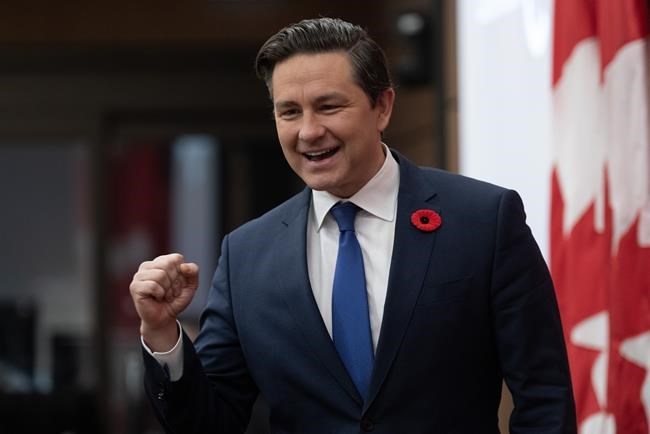OTTAWA — The Conservatives moved Wednesday to make carbon pricing the ballot box question in the next federal election, seizing on public anxiety about affordability and seeing a crack in the Liberal government's carbon-price armour.
"A carbon tax election," Leader Pierre Poilievre proposed in a speech to his caucus in Ottawa.
Last week, the Liberals said their government would pause the carbon price on home heating oil for three years to allow Canadians who use the fuel more time and money to replace it with electric heat pumps.
They're also expanding a program to help people buy heat pumps and doubling the top-up to the carbon-price rebate for rural Canadians, who tend to drive longer distances and have fewer options to reduce their fossil-fuel use.
The announcement did not land well, particularly in Western Canada, where a majority of households use natural gas to heat their homes and won't be getting a carbon-price reprieve.
Prime Minister Justin Trudeau defended the decision Wednesday, saying it takes into account the price of home heating oil compared to other fuels, as well as the homeowners who are most likely to use it.
"Home heating oil is more expensive than other forms of heat, and home heating oil is disproportionately relied upon by lower-income Canadians in rural areas across the country who need more support," Trudeau said.
Liberals are also now pointing out that while a larger share of Atlantic Canadians rely on home heating oil, only one-quarter of home heating oil users live in Atlantic Canada. Forty per cent live in Quebec, 20 per cent reside in Ontario and 10 per cent are in Western Canada.
Rural Development Minister Gudie Hutchings undermined that line of defence Sunday when she suggested on CTV's Question Period that the move was a response to the efforts of a strong Liberal caucus in Atlantic Canada.Â
She implied that if Western Canada wanted influence in Ottawa, it needed to elect more Liberals.
Nova Scotia Liberal MP Kody Blois called Hutchings's comments "unfortunate" because they characterized it as an Atlantic-specific issue, and not a national program that was "driven on pure politics."
"I think I'll let Minister Hutchings speak for herself," he said.Â
"But what I can say is yes, of course, as an Atlantic caucus this is a really acute issue. But we drove a national policy change that is going to make a difference across the country. This matters in rural Ontario. The rural rebate matters in rural Manitoba (and) Saskatchewan."
Blois said in his rural Nova Scotia riding of Kings-Hants, 70 per cent of households don't use home heating oil. But he still fought for those who do.
"I will tell my folks at home in Nova Scotia that are using natural gas, who are paying half the (purchase) price of someone on heating oil in Nova Scotia, that at the end of the day there is other federal programs should they choose to want to help make a transition or reduce their reliance on natural gas," he said.
But Poilievre jumped on Hutchings's remarks as proof the Liberals are using the carbon price as punishment, not climate action.
Next week, the Conservatives aim to put a motion in front of the House of Commons calling on the government to exempt all home heating fuels from the carbon price until the next election, and then ask Canadians at the polls to decide if they want the price reapplied.
"I want to make a deal with him," Poilievre said of Trudeau. "We all know that we're not going to agree on the carbon tax. He wants to raise it, I want to axe it, we all know that, OK."
Trudeau's announcement last Thursday amounted to a "flip-flop," he added, as well as an admission that the federal policy is costing Canadians in the midst of a cost-of-living crisis.
"So, let's make a deal," Poilievre said. "Let's pause the carbon tax on all home heating until Canadians go to the polls, so that we can have a carbon tax election."
Trudeau seemed eager to go to battle with Poilievre over climate action.
"I think Canadians are deeply, deeply concerned about the need to continue to fight climate change in ways that makes life more affordable for them," he said.
"That's what we're doing and that is absolutely something I am going to continue to stand for unequivocally, while Mr. Poilievre has no plan to fight climate change and therefore no plan for the economy."
Alberta MP and Employment Minister Randy Boissonnault said the Liberals have already fought and won elections with carbon pricing as a ballot question.
"I know it would be the fourth one that I've fought," Boissonnault said.Â
"We now even have the Supreme Court basically saying that a price on pollution is not only legitimate, it's part of the framework that we have. So if Mr. Poilievre wants to fight the next election on that, I welcome it."
The Liberals first pushed carbon pricing as an electoral promise in 2008, but lost that election to the Conservatives. The 2015 platform pushed climate action but didn't specifically call for a price on pollution, but it was in the Liberal platform in both 2019 and 2021.Â
Following the 2019 election, New Brunswick Tory Premier Blaine Higgs said he would stop protesting the federal carbon price program because voters had spoken when they re-elected the Liberals after the carbon price had been applied.
"People voted for it, so we have to find a way in New Brunswick to make it work," Higgs said the day after that vote.
This report by The Canadian Press was first published Nov. 1, 2023.Â
Mia Rabson and Stephanie Taylor, The Canadian Press

